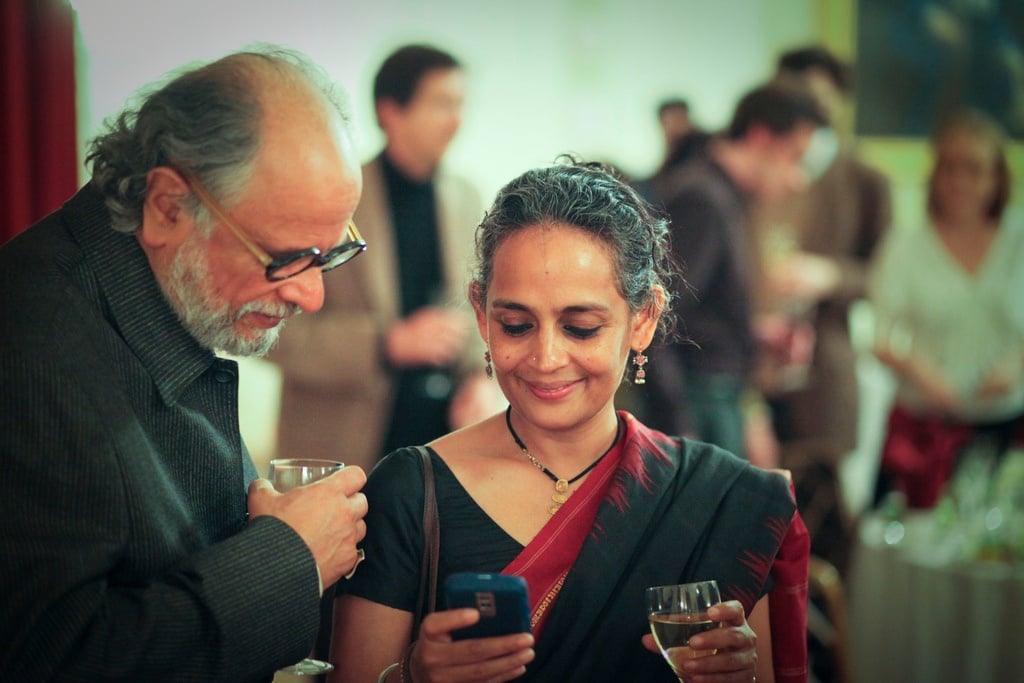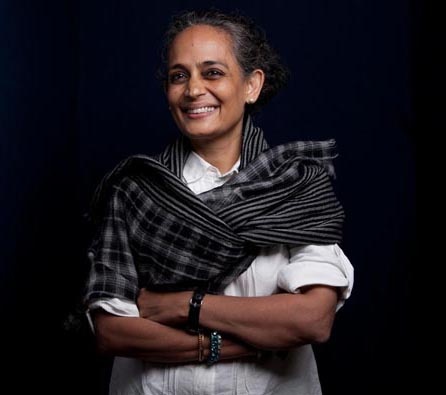Herstory: Arundhati Roy, A True Literary Activist
 Contributed by
Michaela Anchan
December 13, 2015
Contributed by
Michaela Anchan
December 13, 2015

Many literary enthusiasts will have encountered Arundhati Roy, and her Man Booker Prize-winning The God of Small Things. But there is more to Roy than just her writing – she is also an actress, and activist, an intellectual, a political commentator, and a powerful and vocal female role model across South Asia and the world.
Arundhati Roy was born to a tea plantation manager father and a women’s rights activist mother on November 24, 1961 in Meghalaya, India. Her parents separated in her toddlerhood and a few years after this separation, her mother opened a school in Kerala where she lived with her brother and maternal grandmother as well. Roy left Kerala as a teenager to live in a small hut and sold empty bottles for a living but eventually moved on to study architecture and graduated from the School of Planning and Architecture in Delhi.
Her post-school life saw her holding a position with the Delhi-based National Institute of Urban Affairs. In the midst of her busy work life, she met Pradip Krishen, a filmmaker, who would soon become her husband. They briefly collaborated in some films (one of which was the award-winning Massey Sahib) before Pradip ended up working various jobs after feeling disillusioned by the film world. This would cause tension in their relationship, and the two eventually split up.
Roy’s short-lived relationship with her ex-husband most likely sparked her step into the film industry. She wrote screenplays based on notable experiences in her life, and sometimes acted as well. Her skill was noticed by many, as evidenced by her winning the National Film Award for Best Screenplay in the year 1988.
In 1997, her novel The God of Small Things was published. It is semi-autobiographical, based on childhood experiences and the novel was the one work that allowed her to rise to fame on an international scale. Prizes and praises included The Booker Prize for Fiction (1997), a listing in the New York Times’ Notable Books of the Year (1997), sitting on the fourth position of the New York Times’ Bestsellers list (Independent Fiction category), stellar reviews in American and Canadian broadsheets, being noted by TIME magazine as one of the five best books of 1997, and more. It guaranteed her financial freedom also.

Of course, not everyone sung praises for Roy’s work. It was not received well in the United Kingdom, with literary judges and publications called her work atrocious. In India, The God of Small Things was vehemently criticized by many, especially Kerala’s Chief Minister at the time, Mr. E.K Nayanar, who accused it of being ‘anti-Communist venom’ and obscene.
Still, she continued with her written work, this time for films and television serials. She sought opportunities to contribute and collaborate on publications that she found to be within her line of work and interest.
After her best-selling novel, Roy spent a lot of time on her work with political activism. She became an anti-globalization spokesperson and a neo-imperialism critic. She spoke out a lot about her anti-American views, most especially about their foreign policy and in recent years about the war in Afghanistan, with a personal analysis of everything being rooted to American capitalism. She questioned and opposed Indian policies that were in favor of both industrialization and the use of nuclear weaponry, and wrote documents that support these causes and beliefs. She strongly criticized Israel in 2006 for the Lebanon War, calling the event an act of state terror and many more.
In 2002, she donated the money she received from her Booker prize and other royalties so as to fund a project that would address the concerns of the 500,000 people affected by the controversial Narmada dam project. For this cause, she also appeared in a documentary. As a result, she was criticized by members of the Congress and leaders of the Bharatiya Janata Party in Gujarat and was served a legal notice for contempt. Despite making an intelligent statement on her part, the court still ended up sentencing her to one day’s imprisonment as well as being fined Rs. 2500 for her “crime”.
In 2008, Roy announced her support for Kashmir’s independence from India, in light of the massive demonstrations in that same year that also advocated for the same cause. Unsurprisingly, she was criticized by the INC (Indian National Congress), the BJP (Bharatiya Janata Party), and other public and private political groups that called on her to withdraw her statement, which they deemed to be “irresponsible” and not at all aligned with historical facts and evidence.
For her tireless work in putting these and more issues to light, Roy won even more awards for her work in political and social activism. These include: The Cultural Freedom Award from the Lannan Foundation (2002), A Woman of Peace special recognition in the Global Exchange Human Rights Awards (2003), The Sydney Peace Prize (2004), The Sahitya Akademi Award for her essays that touched on contemporary issues (2006) (though she declined to accept it as a form of protest for the local government’s inkling towards US-influenced economic neo-liberalization and militarization), The Norman Mailer Prize for Distinguished Writing (2011), and was recently featured in the 2014 list of 100 most influential people in the world by Time 100.
With notable accolades and the ability to influence people to work for the greater good, Arundhati Roy is indeed a woman who selflessly uses her talents – writing and the gift of speech – to the hilt, despite the threat of opposition, so that those who are truly in need of help or attention may receive it.
Visit Woolf Works page to find out more about the Coworking space.











Sorry, the comment form is closed at this time.